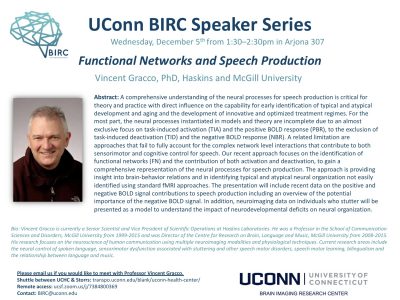Vincent Gracco, PhD
Wednesday December 5, 2018 1:30-2:30 PM Arjona 307
Haskins and McGill University
Abstract: A comprehensive understanding of the neural processes for speech production is critical for theory and practice with direct influence on the capability for early identification of typical and atypical development and aging and the development of innovative and optimized treatment regimes. For the most part, the neural processes instantiated in models and theory are incomplete due to an almost exclusive focus on task-induced activation (TIA) and the positive BOLD response (PBR), to the exclusion of task-induced deactivation (TID) and the negative BOLD response (NBR). A related limitation are approaches that fail to fully account for the complex network level interactions that contribute to both sensorimotor and cognitive control for speech. Our recent approach focuses on the identification of functional networks (FN) and the contribution of both activation and deactivation, to gain a comprehensive representation of the neural processes for speech production. The approach is providing insight into brain-behavior relations and in identifying typical and atypical neural organization not easily identified using standard fMRI approaches. The presentation will include recent data on the positive and negative BOLD signal contributions to speech production including an overview of the potential importance of the negative BOLD signal. In addition, neuroimaging data on individuals who stutter will be presented as a model to understand the impact of neurodevelopmental deficits on neural organization.
Bio: Vincent Gracco is currently a Senior Scientist and Vice President of Scientific Operations at Haskins Laboratories. He was a Professor in the School of Communication Sciences and Disorders, McGill University from 1999-2015 and was Director of the Centre for Research on Brain, Language and Music, McGill University from 2008-2015. His research focuses on the neuroscience of human communication using multiple neuroimaging modalities and physiological techniques. Current research areas include the neural control of spoken language, sensorimotor dysfunction associated with stuttering and other speech motor disorders, speech motor learning, bilingualism and the relationship between language and music.
Visitors from UCHC are encouraged to use the UCHC-Storrs shuttle service. Talks can also be joined remotely. Please contact us if you are interested in meeting with the speaker.
